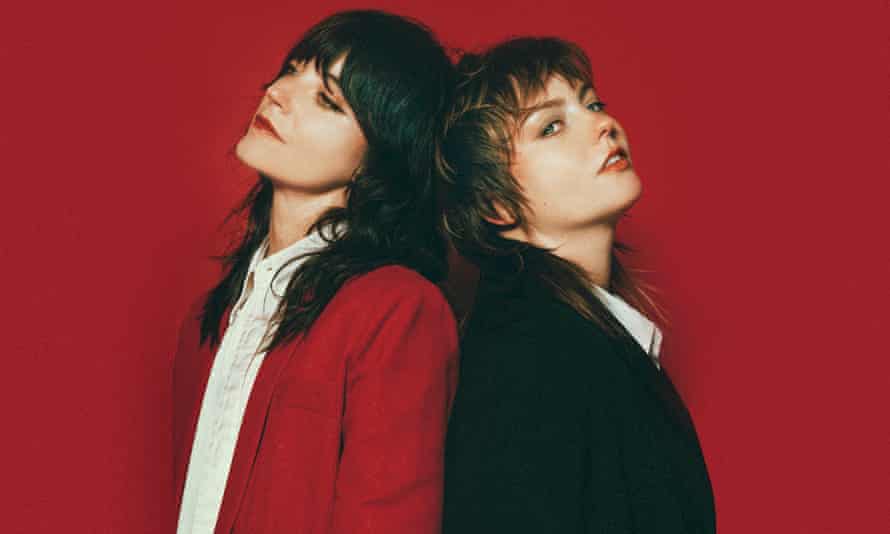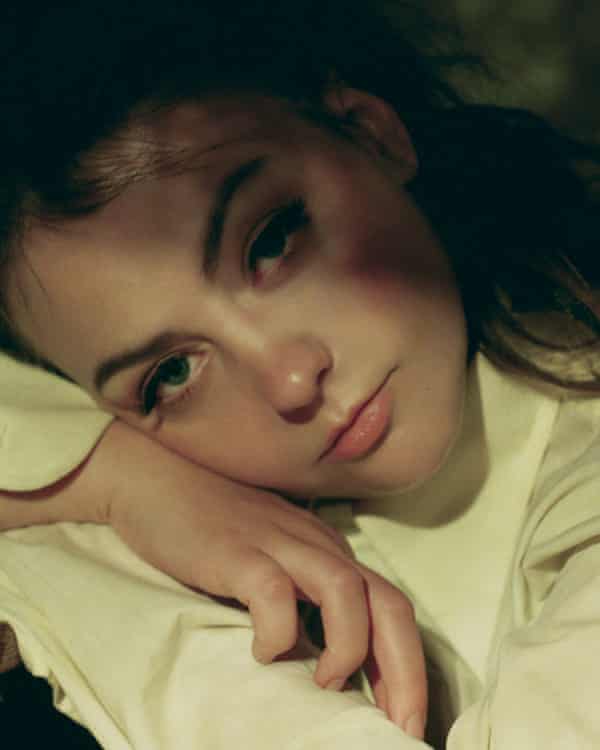In a small record shop in London, on a humid Sunday afternoon, Angel Olsen sits on the counter, dressed in double denim, legs dangling, guitar across her lap, ready to play a handful of songs from her new album Big Time. “Do you guys do this often?” she says, to a crowd of about 30 people, most of them in a state of hushed awe. She smiles. “Cos I certainly don’t.”
She is playing music in front of people for the first time in a very long time. In fact, it is her first time playing these songs in front of people at all. Big Time is an intimate record, telling deeply personal stories of romance and grief, and Olsen is allowing herself to be more open than she has ever been before. Some of the songs require her voice to go so low that it drops into a whisper. You have to come close to catch it.
We meet for coffee the day after the show. “I was really nervous,” she says, which surprises me. She doesn’t seem the nervous type. Olsen released her first studio album, Half Way Home, in 2012, and each record that followed it – Burn Your Fire for No Witness, then My Woman – upped the ante in terms of ambition and success. On 2019’s All Mirrors, she lurched around in the darkness of a bad relationship, its highs and lows playing out in swoops of melodramatic, string-soaked emotion. When Olsen plays live with a full band, usually to far bigger crowds than those in the record shop, she seems supremely confident. “It’s different when you’re on stage, as you are far away from everyone, and there’s lots of people. It’s harder when everyone’s looking at you,” she reasons. “I’ve been so used to living my life in a different way. It’s almost just a story that I do this for a living. And then I’m like: ‘Oh shit, people are here to see me.’”
When she is living her life in a different way, at home in Asheville, North Carolina, she doesn’t play music often. Instead, she says: “I follow my obsessions. I think that’s why I end up leaning into different genres, because the obsession makes it new again.” Her last EP, Aisles, was a synth-heavy collection of 80s covers, though she admits that hopping around different genres makes it difficult to come up with a coherent setlist.
Big Time is another departure. Its sound nods to Americana and the country music that has always trickled through her various incarnations. The obsessions this time were Neil Young, Big Star, Dolly Parton and Dusty Springfield. The title is ambiguous – does it mean success, is it a point of emphasis, a declaration of certainty, or all three? – but the songs are clear-eyed, softer, more personal and more direct.
They were written during an eventful period in Olsen’s life. She was raised in St Louis, Missouri, as one of eight children, having been adopted aged three by her foster parents, who were already retired when she came along. Last year, she met a new partner, and, at 34, made the decision to come out to her family and fans. Her father died days later; her mother a few weeks after him. Big Time is as rich with love as it is heavy with loss, often reflecting on both within the same four minutes of song.
In her other eras, Olsen has said that she writes in character and that her songs are not autobiographical. She has worn wigs and costumes, and been evasive in interviews, even issuing fact sheets before journalists met her. There is none of this now. “I felt a little bit more at ease with talking about love and how I fell in love,” she says. What made her feel like that? “I think after losing my parents, that brought everything to the forefront. Who cares about these other troubles in my life? It made me feel quiet. I’m older, too. I’m 35. I’m getting used to the fact that things get more complicated as we get older,” she says. Then adds, with a Parton-esque flourish: “You can either feel sorry for yourself or learn how to laugh deeper.”
When she was writing these songs, did she know that she was going to be so open about what inspired them? She shakes her head. “I’m still kind of like: ‘Am I crazy?’ I didn’t know that I would tell everyone this.” There is a companion film to the album, a collaboration with the director Kimberly Stuckwisch, who made the video for Olsen’s anthemic duet with Sharon Van Etten, Like I Used To. The film compiles the singles’ videos into a longer narrative, inspired by a dream Olsen had on the day that her mother died. It is an eerie fable with touches of Twin Peaks and Alice’s Adventures in Wonderland – at one point it includes a voicemail she received from her mother. “It’s definitely scary. But I want to talk about my mom, and I want it to be a homage to her. I wanted to share her voice with the world, too.” She smiles, a little sadly. It hasn’t even been a year since her mother died. “I just hope she’s not turning in her grave about it.”

Olsen’s partner, Beau Thibodeaux, makes an appearance, pushing Olsen to come out to her family. “That wasn’t based in reality,” she says. “I wasn’t pressured by my partner in that way. But it’s representing dealing with the fear of losing everyone.” As well as co-starring in the film, Thibodeaux also co-wrote the song Big Time, which is as close to a love song as Olsen has ever put out. “They [Thibodeaux] were there for me when my mom died. It’s scary to share that with a partner, because you never know what will happen, but I’ll never forget that they were the one that was there for me.”
Had Olsen ever worked with a partner before? “I had dated Meg Duffy [of Hand Habits] for a few months, and we sang a song together, but I’d never written a song with anyone.” Olsen tells the story of her relationship with Duffy; the pair had been friends for years, and had toured together, but she suddenly found it difficult to be around Duffy and couldn’t understand why. It had never occurred to you that it might be romantic? “I mean, I had flirted with it. I just assumed nothing would happen. Because I was too afraid, really.” Then the pandemic began. “I was like, well, if it’s the end of the world, this is the time. So when that didn’t work out, it was heartbreaking.”
They are on good terms now, but during that heartbreak Olsen felt as if she was 15 again. “It sucked. But then I moved on and fell in love again, and that’s what happens, I guess.” Last year, Olsen posted several pictures of Thibodeaux to Instagram, with the caption “My beau, I’m gay”. She says it wasn’t particularly considered. “We were just laying in bed, and they were like: ‘What if you came out today?’”
But she did have to think about the wording. “The way that I identify is more pansexual. I connect with a human being.” She opted for the word gay, “because people don’t say the word ‘gay’. They’re so afraid of it. Maybe that puts me in a box,” she shrugs, but there is little danger of that anyway. Olsen is tentatively working on a screenplay, though she is very much at the beginning stages. “Big surprise: there’s death in it,” she says.
When Olsen talks about the stories that informed Big Time, she wonders if she might come to regret her newfound candour. “I feel very strongly about things and then I change my mind,” she says, and laughs. Has she changed her mind about this? “Not yet. But I’m sure by the time I make the next record, I’ll be trying to fix whatever I fucked up on this one.” She smiles. The thought doesn’t seem to trouble her much at all.

